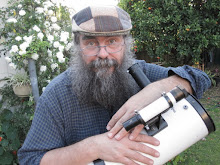Saturday, March 26, 2011
Earth Hour 26 March 2011 - What can I see in the sky?
 Eastern Sky at 8:30 pm daylight saving time.
Eastern Sky at 8:30 pm daylight saving time.At 8:30 pm on Saturday 26 March thousands of people will turn their lights and other electrical equipment off for Earth Hour. What can you do in the dark? Well, you know my answer to that … go out and look at the sky! If you have an old telescope lying about, or a pair of binoculars, go grab them and dust them off. Why not hold an Earth Hour Star Party?
For us urbanites and suburbanites the sky won’t get very dark during Earth Hour, because essential lighting will stay on. However the sky will still be great to see.
Over on the eastern horizon the brightest object is Saturn, close to the bright white star Spica. You will need to wait a bit for Saturn to be higher in the sky before using a telescope on it.
 The North-western sky at 8:30 pm local daylight saving time (click to embiggen)
The North-western sky at 8:30 pm local daylight saving time (click to embiggen)To the West, Orion the Hunter and his belt (the saucepan to us Aussies, young men dancing to the Boorong people) can be seen clearly, below that is the V-shaped group of stars that make up the head of Taurus the Bull with the baleful red star Aldebaran as its eye. If you are lucky to have a clear, level horizon you can see the Pleiades Cluster twinkling above the horizon.
To the South, you can see the pointers showing the way to the Southern Cross. Just below Mimosa, the second brightest star in the cross, the delightful Jewel Box cluster is visible in binoculars and telescopes. Above the Cross is the rambling constellation of Carina, the keel of the mythical ship Argos. There are lots of small beautiful clusters in the sky here. Sweeping around with binoculars will find many delightful groups of stars. You may even find the Tarantula Nebula!
 The Southern sky at 8:30 pm local daylight saving time (click to embiggen)
The Southern sky at 8:30 pm local daylight saving time (click to embiggen)Sadly, there are no passes of the International Space Station or Iridium flares during Earth Hour, but look carefully and you might see some dimmer satellites tumbling past, or maybe even a meteor!
In no time at all the lights will come on., and you will not have finished exploring the skies.
Labels: Earth Hour, Observational Astronomy



 Click to read about or order
Click to read about or order Click to read about or order
Click to read about or order Click to read about or order
Click to read about or order Click to read about or order
Click to read about or order




